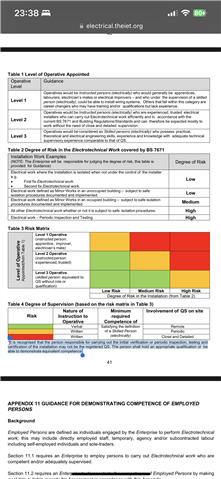Hi all new here so be nice, I'm sure you are all aware of the latest guidelines of Electricians now having to be qualified the same as a QS to enable to carrying DB swaps and EICRS, I know for a fact most of the industry is ignoring it in the domestic world... I'm guessing the way they are mitigating this new 'risk' element it is the phrases of 'close and detailed' and 'or be able to demonstrate suitable competence'
Do you guys have anything that's popped up in here before or is it end of got to have the same as a QS end of.
E.g an engineer who has been working in the industry 30 years has a level 3 NVQ (but not the proper am2 backed one) but has 18th and 2391, under these rules they are deemed level 2 and cannot perform level 3 tasks without being labelled a high risk and under close and detailed supervision. Has anyone else had to deal with this as it seems we have cut out the majority of the experience from the industry or are companies just ignoring it?
Thoughts?
